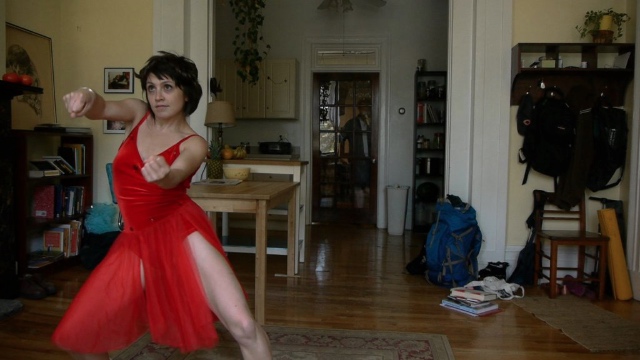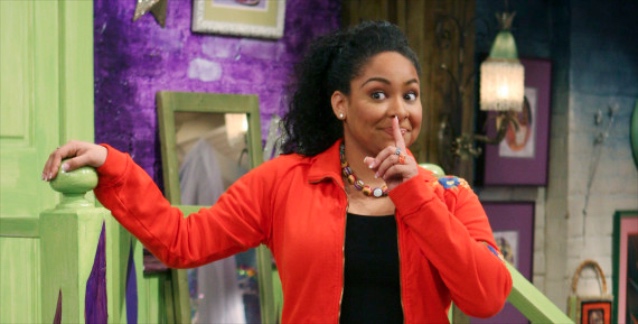
By: Deragh Campbell
Tallie Medel is a New York-based actor and comedian, performing with the comedic dance troupe Cocoon Central Dance Team, appearing in TV shows such as Inside Amy Schumer and starring in such films as Joy Kevin (Caleb Johnson, 2014), Stinking Heaven (Nathan Silver, 2015) and The Arbalest (Adam Pinney, 2016).
We sat down with Tallie over Skype to talk about naturalism versus exaggeration and fighting for a character’s dignity.
cléo: I’m particularly interested in talking to you for the LOL! issue of cléo because you have a comedy background. But over the past five years, you’ve been appearing increasingly in dramatic (or at least not straightforwardly comedic) films. Is there a difference in the technique you use in approaching comedy and drama?
Tallie Medel: I always appreciate when people approach comedy and drama identically, because you can tell when someone is trying to play funny. It doesn’t work. There’s a lack of commitment to the delivery. That’s one of the funniest things in comedy—ultra-commitment to your delivery.
That’s one of the funniest things in comedy—ultra-commitment to your delivery.
Think of the comedy trio Stella [featuring Wet Hot American Summer’s Michael Ian Black, Michael Showalter, and David Wain]—they were a huge influence on me in high school and college. They were doing such grotesque and ridiculous things but it was such hyper-committed acting.
There was a long time when I thought maybe I shouldn’t do drama at all, because I hated watching people do drama badly. It really upset me, I took it personally. If you fictionalize an event and don’t do it right, it’s such a violent and selfish act toward the victims and their families. I think being disingenuous is incredibly dangerous. So for a while I thought maybe comedy was the only answer for being a performer. Don’t try and mar someone’s real experience. Don’t reenact real pain. I came back around to it though; I don’t know how. I think just seeing work that is good and is progressive [changed my mind].
cléo: It’s funny that you already mentioned commitment because one of the things that I’ve always admired about you as a performer is your focus and commitment to what you are doing. At the same time, I find that you have really incredible rhythm and timing. I mean, absorption is the naturalist credo and timing is usually more associated with comedy. Do you see absorption and rhythm in conflict or following from each other?
TM: I went to acting school sort of, but not quite, on a whim, because I think I always wanted to but it seemed humiliating to admit that to myself. When I got there I felt extremely overwhelmed because the other students had so much knowledge, like about the Suzuki and Meisner methods (stuff that I’ve still never learned). I also felt that I was sometimes seeing a bag of tricks, though maybe I wasn’t and I was just a judgmental, insecure 18-year-old. Yeah, that’s what I was. But they could make me believe they cared about this Shakespeare monologue even if I didn’t believe anything they were saying—they were still doing it right. I felt like I didn’t have any of the skills that they had and the only thing that made sense to me was connecting to my scene partner because it was the only information I had.
I started studying clown, which encouraged me in the direction of improvisation and connection. It solidified the idea that being present is often all you need. It made me feel invigorated and proud to be an actor.
cléo: Do you see an attachment to rhythm as detrimental? Naturalism and improvisation are no longer cutting edge—it’s mainstream, Jean-Marc Vallée uses it—to the point that something really choreographed and precise becomes the thing that is exciting.
TM: Totally, I love when things are codified and have to be presented in a very certain way. I’m growing averse to hyper-naturalism or the idea that improvisation is always the best route to being natural. I remember a filmmaker telling me out of the blue, when we’d already been filming a few days, that my character was bulimic and me responding: “No she’s not.” That’s such wildly irresponsible story telling. You can’t just “play” a bulimic, you need to prepare for that. That’s not how it works—how can it become a cohesive part of the character and story? I’m figuring out where my loyalties lie with my love for naturalism and improv versus extended rehearsals and character preparation. For me that particular moment was a problem.
cléo: We’ve both been part of films that prize naturalism but comedy is often about exaggeration in order to point to the absurdity of the reality. What are your feelings about being natural as a performer? What does natural even mean? Do you think that an expression of something is equally valid or more valid than the most natural thing in representing reality?
TM: Both have a place and I really enjoy both. In film I did a lot of naturalism to start—I was shooting films with Daniel Scheinert, who was influenced by Joe Swanberg, and we were experimenting a lot with being ourselves on camera. I really loved David Gordon Green’s All the Real Girls (2003). I was impressed by how people can exist so fluidly. I still love that movie and appreciate that documentary-like aesthetic of acting. That’s really hard; you have to be very invested and comfortable with yourself. I admire performers that can commit to big feelings and make them honest.
Comedy is committed to portraying big ideas and feelings.
Comedy is committed to portraying big ideas and feelings; people dive into stereotypes and explode them. I’m now finding the bravery to go bigger in film and I’m getting that from the comedy community. People are putting so much energy and so many big ideas out there and I’m energized by the effort. I think that’s the energy we all need.

cléo: You’ve staked out an amazing place as a performer in being able to portray an enormous, even ridiculous, feeling with unflinching commitment. You don’t play things down for the sake of appearing “natural” and I think that’s why you bring something refreshing to dramatic film. What I find so exciting about your characters Joy (Joy Kevin) and Sylvia (The Arbalest) is the feeling that you are really fighting for their dignity. They don’t let the joke be on them. There are some really sophisticated metaphors in Joy Kevin about Joy’s need for space and privacy—she gradually throws all the furniture out of her and her husband’s apartment; the corporate asshole who commissioned her for a dance piece insists on sitting in on rehearsal and eventually tries to direct her. Joy never shrugs these things off. She takes these invasions of her privacy very seriously and she refuses to let either of the men dominate her. I guess what I am asking is, where do you get this energy and fight?
TM: I think a lot of it comes from anger and politics. When I was shooting the short Muck (Bruce Smolanoff, 2015) about an angry comedian, it was around the time of the UCSB shooting [when a gunman, motivated by misogyny, killed six and injured 14 others]. This kid [the 22-year-old perpetrator] was part of a group of men that use phrases like, “what’s your rape count?” and talk about how they’re owed virgins. I was so angry at that time that I started getting in physical fights with people I saw doing something violent or mean.
I definitely feel a huge responsibility to the women that I play to make them as brave as possible and, if they need to be, as mean as possible. Because I can’t imagine not doing that. Like playing Sylvia, I knew what was going to happen to her, that Foster was not a good man and would ruin her life. It comes from a political place. A lot of the time I feel really angry.
cléo: With Sylvia, she makes a business deal with Foster Kalt and she refuses to be a romantic object. Foster has the amazing line in the narration, “I sent her the cheques and love letters. She sent me back the love letters and kept the cheques.” He tries to kiss her at one point and she cringes and goes, “Uggggghhhhh”. The joke ends up being on the males and their effort to possess and objectify the woman.
TM: Sylvia is based off women I’ve known who could say no; who felt it was their duty to. It was so much fun to say no to Foster Kalt over and over again. He’s a self-indulgent asshole. In a scene that was cut, he would snap his fingers to get my attention then say, “I love you.” And she is so disgusted. It’s just the literal version of how that happens. And she’s not afraid to say, “I don’t need this right now, this isn’t about me, it’s about you.” It’s so nice to say the things you wish you felt brave and safe enough to say [in real life].





